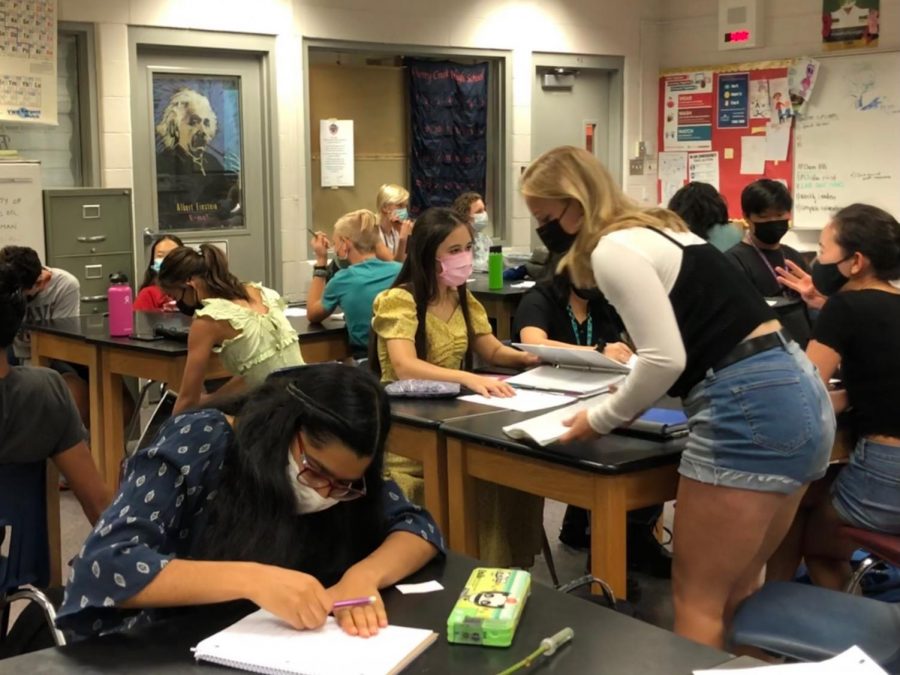Are Mask Mandates Still Necessary Despite High Vaccination Rate? 62% Of Creek Students Say Yes
Students learn while masked in a science classroom at Creek.
September 30, 2021
It has been more than a year since Cherry Creek School District re-opened their facilities after closing them almost completely for the COVID-19 pandemic, yet nothing seems to have gotten better. With the recent implementation of the new mask mandate by Tri County Health, students and staff have expressed their frustration behind the seemingly stagnant, unrestored state of the pandemic. However, in consideration of rising vaccination rates, some have questioned whether or not a mask mandate is even necessary.
Vaccination rates in Colorado have reached around 70%, and a recent survey of 190 Creek students revealed a surprising 94.5% vaccination rate. In the same survey, however, 62% still thought that the mask mandate is necessary. Why is that?
“It’s still about safety,” English teacher Dr. Joel Morris said.
Safety, not in the sense of individual protection, but rather the security of society in times of uncertainty. As more and more people are getting their COVID-19 vaccines, the purpose of masks has become less and less about personal protection. Instead, masks have become a statement of courtesy for those who are still at risk and a societal call towards normalcy.
Sophomore Matthew Ha, despite being vaccinated, still chose to wear a mask even before the mandate. “I was worried for my dad who had recently undergone surgery,” Ha said. “He was weak and just came back from the hospital. I didn’t want to take any chances.”
Morris wore his mask for similar concerns over his children at home. What can be seen from both is their selfless concern over others. “Anything we can do to try to diminish the spread of [COVID-19] is something that I endorse,” Morris said, emphasizing the word we.
The pandemic has become far more than an individual issue. “I would hope that we as a community could come together and support one another,” Morris said. “And then [use] the resources and connections we have as a community to actually put our own self interests aside in order to help others who may not have the advantages or the help that we have. I want to do my part to try to get through this as quickly as possible.” Morris puts it best when he called the pandemic a “challenge to our spirit of individualism.”
However, the catalyst to the new changes has been the growing uncertainty over the pandemic. The recent spike of COVID-19 cases in Colorado, along with data from the year prior, have shown that the pandemic is not on a decline. Additionally, the emergence of the new delta variant and many reports of vaccinated people contracting COVID-19 have revealed the unpredictability of the pandemic.
Vaccinated people can still contract COVID-19 yet not show symptoms, freshman Avery Reitz emphasized. “This means that you would be spreading coronavirus to everyone you are in contact with for several days, and this could mean that someone who is unvaccinated could be exposed. It is integral that everyone wears masks inside, regardless of their vaccination status.”
In between the insecurities and uncertainties surrounding the pandemic, one thing remains certain: the people’s desire to return to normalcy. “I would love for things to be as normal as possible,” Morris said. “If we can all support this or at least can go through with it…maybe then, later in the year, we’ll be able to do away with [masks].”
More importantly, however, is the fight to maintain full-time in-person school. “We don’t want things to fall back the way things were last year,” junior Tsega Tatek said, referring to the chaos of online classes and hybrid schedules. “If this is what it takes to keep the whole school in-person, I’m all in for it.”
“The best way to help our kids with their mental health and their physical health is to keep them in school,” TCHD’s executive director Dr. John Douglas said in an interview with CBS4 Denver. “It’s a lot better to see half of your peers’ face than to not see your peers’ face at all.”




















